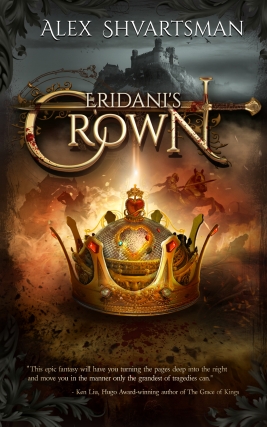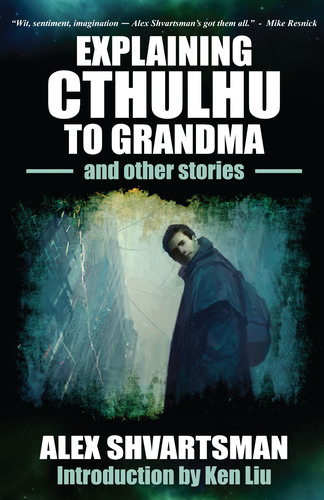Jake Kerr recently wrote an incredibly insightful post on Codex Writers–a private forum both of us belong to. He graciously allowed me to share it here. Jake’s novelette “The Old Equations” was recently nominated for a Nebula Award. You can visit his website at www.jakekerr.com
1. Cast your net wide.
What’s better than two critiques? Four critiques. What’s better than four critiques? Eight critiques. When you start, your goal should be to identify a stable of people who will have a keen eye on identifying the mistakes that you consistently make but can’t seem to catch yourself. I call these blind spots, because they don’t indicate that you are a poor writer. They just indicate areas where your personal shit detector appears to be broken. These are different for everyone, which is why one person’s awesome critiquer is another person’s waste of time.
The good news is that you can find good critiquers anywhere. Ken Liu asks for people to critique his stuff on Twitter. I’ve done the same and found at least one person that has provided me with awesome feedback. That said, there are places you should ask for critiques with knowledge that the quality will most likely be better–fellow Codexians, online groups like Critters or OWW, local critique groups, etc. The point is that you’re looking far and wide for people that aren’t afraid to point out things you haven’t noticed.
I have had dozens of people critique my work. I’m down to a group of 5-7 now that I send stuff, too, but I will occasionally cast that net out again via Twitter or Codex or what have you. Because it is my belief that a few more strokes with the whetstone will always make the blade sharper.
2. ASK FOR CRITIQUES.
The great thing about the writing community is that we’re generally a supportive and helpful bunch. Our instincts are that we LIKE to help others. We LOVE to see writers improve. So you, as a writer, need to tap into that, and you can’t be passive about it. Ask someone to critique your work. Don’t be shy. They’ll say “no” if they don’t have time. Browse the Codex critique folder. Read the critiques of others. If someone is saying something that resonates as something you need to hear, contact them directly and ask them to critique your work.
Don’t be annoyed if people say, “No.” Some will, of course, and that’s their right, and you should respect that. But just because the first four people you ask say “no” doesn’t mean that they resent you for asking or that it is a wasted exercise. This is obviously not limited to Codex. I’m sure you have friends that are writers. You should ask them. You should ask them if they have someone they like using. Again, don’t be shy. This is all part of casting your net wide, and has been mentioned in another thread, fishing in the fertile waters can be very helpful.
3. Identify your weaknesses and focus on the people who are very good at identifying them.
We’re all neo-pros here. We should have at least a halfway decent personal shit detector. We know we have flaws, but it SO DAMN HARD TO IDENTIFY THEM. The good news is that when people point them out it’s like someone turned the light on in a room where you were squinting to see. It’s suddenly, “Holy shit, that’s exactly what this story was missing. HOW DID I MISS THAT?” Those are the people who will help you the most.
4. Ignore all the general advice like “If eight people point it out, it’s probably a flaw. If two do, it’s probably not.” This and similar advice is kinda bullshit.
Focus on two points: 1) Is the critical comment supported by the critiquer in a compelling way and 2) Does it just plain make sense to you. This isn’t a democracy. It’s a method of refining art where some people are just better than others.
So, it’s entirely possible that only one or two of the people critiquing your work have a halfway decent shit detector. It’s entirely possible that you have eight critiquers that just love the story and don’t mind that the characters are wooden or that the gap between scene two and three doesn’t make sense because, dammit, they just love when the princess proves to be a badass and when you did that thing in scene four it made everything else right. Uh, no it didn’t. Be happy you have a kickass scene four, but if ONE person says your scene two to scene three transition makes no sense and you immediately go, “Oh yeah, that’s true.” Then follow the freakin’ advice of the one person. OR, if you don’t understand it instinctively but the critiquer provides plenty of evidence that seems to make sense, at least take a closer look at what he or she is saying.
5. Mercilessly prune people who give unhelpful critiques
If someone gives you an unhelpful critique they are wasting your time and theirs. Don’t ask them again for critiques, and if it’s a group setting where you are required to hear and receive their critiques, then just thank them and toss their critique in the trash or delete it.
Remember, the goal here isn’t to make friends. The goal is also not to be an asshole. So it is perfectly fine to be firm in narrowing down who will see your work, and this can certainly be done without being a jerk. If someone takes offense to it, then you just need to be prepared for that and file it away as their problem, not yours. I know this can be tough, but it’s really the only way to handle it.
Going back to point 3, if eight people LOVE your work, and their critiques make you feel good, but they don’t really help you. Those aren’t the ones you need. If two people identify things that the others don’t, and those things make you uncomfortable or ask questions that you have a hard time answering. Those are the ones who are probably being the most helpful.
6. Don’t ever send your edited manuscript back to the people who critique your work.
When someone critiques your work, they are emotionally invested in it. It is too easy for them to feel hurt if you ignored half of their advice. Never mind that the half you DID take could have been hugely beneficial, many people will be annoyed that you didn’t listen to everything they said. The reality is that you should make your critiquers feel like they are being helpful. After all, you’ve already pruned all the unhelpful ones, right? But you certainly don’t need to justify that by showing them that you’ve taken 20% of their suggestions last time, and this time you took 40%.
This can be difficult when someone specifically asks to see the edited document, but you should still just say, “No.” There is absolutely no reason for them to see it. Their job was to help you, and they did that. They may ask you where you are submitting the story, and it’s fine to tell them, but if a critiquer becomes someone who is constantly asking you for updates, then you know that he or she is WAY too invested in your work. That’s not healthy in a critiquer, and–even if they’ve been helpful–you should consider not using them any more.
You don’t need drama and people identifying with your success as an author. You need a cold ruthless eye wielding a word scalpal who is invested in good stories.
7. Don’t give your next draft back to the same critiquers who read the first draft.
This is basically the same as No. 5, but I want to underscore that it is even true for when you go through multiple rounds of edits. When someone critiques a piece, they have just put themselves in the same role you have–they have become invested in the piece and lost objectivity. Their second glance will be more focused on “Did he or she listen to my advice” and less on “is this a better piece.” Certainly there are exceptions, but this is human nature, and it is perhaps unfair for someone to not judge a revised work based solely on how much you took his or her advice. Besides, a fresh set of eyes is always helpful.
8. Don’t focus on efficiency, focus on results.
If you have a critiquer who provides you with 95% crap advice, but on one specific thing where you have trouble, they are incredibly helpful, keep them and embrace them. There is no acceptable percentage of edits that you need to integrate into a piece. The acceptable number is how many improve the piece. The key is just that–are you getting advice that improves the piece.
So be ruthless not just in pruning bad critiquers, be ruthless in pruning irrelevant advice from good critiquers. This happens all the freaking time, and if your expectation is that you’re getting bad critiques because everyone is giving you some bad advice, then I have a secret for you: EVERYONE will give you bad advice. The good news is that quite a few people also give you good advice while giving you bad advice. Your job is to be comfortable with ignoring the irrelevant from the important.
This is another reason why not to give edited manuscripts back to critiquers, by the way. If their expectation is that you’ll take all of their advice, they’re going to be disappointed. If you took 100% of the advice of even one critiquer, you probably made a mistake.
9. If everyone is giving you horrible critiques, then you probably need to re-think your own critical eye.
Just like you should never expect a critiquer to be 100% perfect, you should not expect a large number of critiquers to be 100% wrong, too. Odds are in those circumstances that you are too emotionally invested in your work to accept objective criticism.
A huge indicator of this is if you get defensive over specific critiques. It’s certainly acceptable to laugh when someone incorrectly changes the spelling of a word you used, but if you find yourself getting upset over an issue and the critiquer is presenting you with a logical reason for his or her critique, you really need to take a step back and examine whether you actually are right. Ultimately, if you are going through critique after critique and getting frustrated at how bad they all are at misunderstanding your skillful narrative complexities or how it is just sad how biased every critiquer is in defining a character as a stereotype when you created her to be a robust anti-stereotype, then you should take a hard look at yourself.
10. If improving yourself isn’t a big goal, then don’t bother with critiques.
If it is more important (and fun!) for you to just write a story and toss it out there, devil may care, then you probably shouldn’t even embrace critiques. They are time-consuming and clearly add a layer of effort to your writing that wouldn’t exist otherwise. If they kill the fun, then just don’t do them. The joy of writing should always be paramount, at least to me.
11. Return the favor
While you should treat critiques with ultimate selfishness, you should not treat the relationship with your critquers that way. In fact, you should be just as responsive to them as they are to you. And remember the rules above–do your best to provide the best critique possible, but don’t become invested in the critique to such a degree that you feel that their work is yours. It isn’t. They may take your advice or they may not. Don’t sweat it. Just keep helping others as they help you. That’s the real spirit of the writing community.








Brilliant essay. Tell your buddy that I’d crit his stuff anytime.
Thanks for sharing.
I found #4 particularly interesting, becuase of course everyone (myself included) gives this advice to newbies. I might categorize it more as an “over-generalization” than “bullshit” – but still a very valid point.
Thanks for sharing this, Alex!
Great advice — and well done on meeting your February Write1Sub1 goals, Alex!